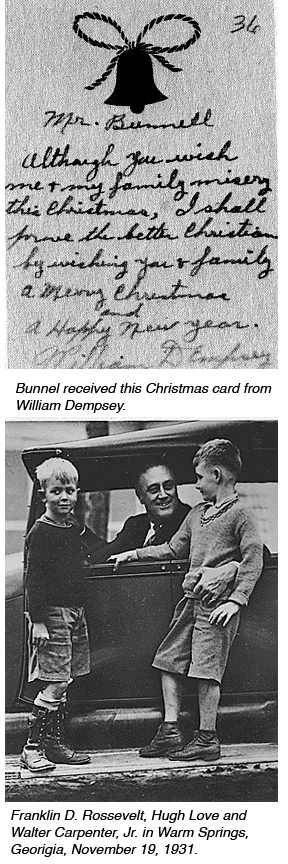Part 6 Merry Christmas, Please Release Me
Part 6 Merry Christmas, Please Release Me

Merry Christmas
In December 1930, the former judge received a brief Christmas card from Dempsey in which he wrote: "Although you wish me and my family misery this Christmas, I shall prove the better Christian by wishing you and family a Merry Christmas."
Early in 1931, Dempsey wanted to know if Bunnell was still interested in the names of the people present at the party where Lavor died. Bunnell said yes and said he would do his best to help apprehend and convict "any other person or persons who took part in the murder of the Anchorage woman.""
After some months of mediation, Dempsey decided he could not reveal the names and it would be "condemnable and unutterably despicable for me to cause them to suffer and jeopardize their happy homes and lives merely to satiate the relentless and vengeance of the Law.""
He then proceeded to reconstruct a drunken brawl where many received wounds and the Lavor woman was accidentally killed—by whom, however, was unknown. In conclusion, he told Bunnell that prison authorities had told him if a recommendation for executive clemency was forthcoming, President Herbert Hoover would grant it. Bunnell refused, telling a friend of the prisoner that he considered him "a menace to society.""
Please release me
Dempsey tried again in 1934, and again he cited many reasons why he should be freed. His family was destitute and needed him and his childhood sweetheart was "still faithfully waiting" for him. Dempsey was certain that President Franklin D. Roosevelt would issue an executive clemency if recommended by Bunnell. "I beg you to recommend my release. Please!" he wrote. He expected to be paroled in a year and a half, and could see no reason to wait that long."
Bunnell again denied the request, as he did the appeal of an old Dempsey family friend, telling her that Dempsey was "a very dangerous man to be at large . . ." He still remembered the revenge threats Dempsey had made at the sentencing."
Dempsey contacted Bunnell again that year and now accused him of narrowmindedness and a vindictiveness which went beyond reason and provided ample proof "that you were unqualified to preside at my trial." He still refused to reveal the names of the partygoers in "the name of Humaneness and Christianity . . .""
This last letter Bunnell considered to be the most aggressive one, revealing no repentance
"by one who claimed to have reformed and to be entitled to further leniency."
Two years later, in 1936, Bunnell informed the parole executive that he considered
Dempsey, if released, to be a menace to society."
He did not want to live "under guard to protect myself against such a vicious criminal." Bunnell was convinced that once released, Dempsey would head north to exact revenge from those connected with his trials. He therefore requested to be furnished with a photograph of Dempsey at the time of his release so he could defend himself.
